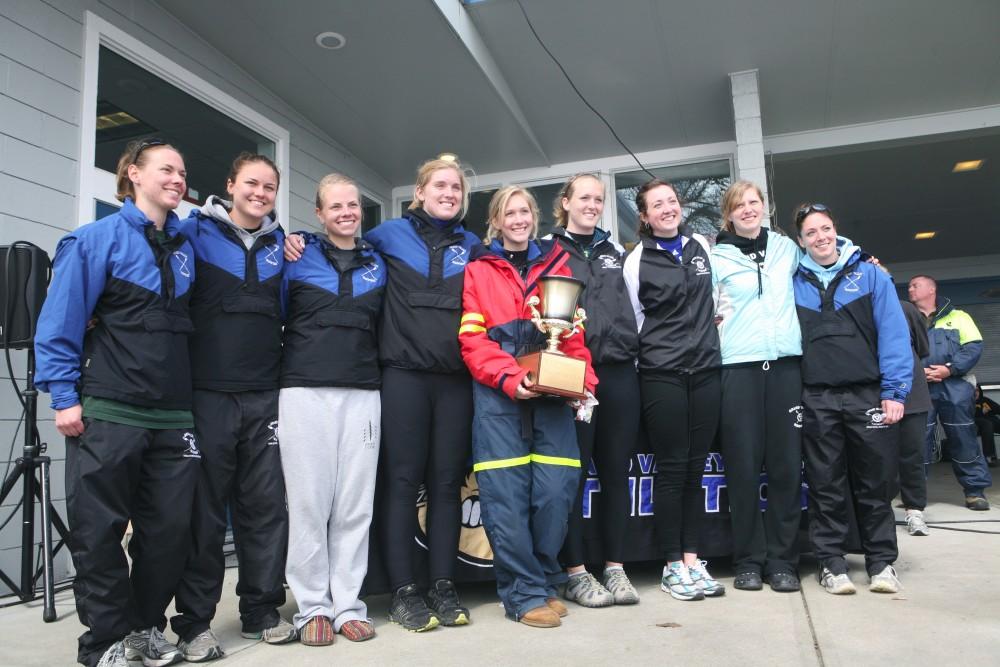Lakers take home trophy at ‘biggest Lubbers Reggata yet’

Grand Valley State Women’s Varsity 8 wins the Nancy Lubbers Cup
Apr 3, 2011
Despite on and off rain coupled with a constant gray overcast, the 16th-annual Lubbers Cup Regatta was a success both for the athletes of the Grand Valley State University Rowing Club and for those who helped to organize the event.
Thirteen rowing organizations from across the United States and Canada competed in the event. The Lakers took both the Spring Lake Yacht Club Cup (for most points overall) and the Lubbers Women’s Trophy (for most women’s points), while Brock University of Ontario, Canada, took the Charles Irwin Men’s Trophy, pulling it from the grasp of the Lakers by one point in the final race.
“I knew we were going to be competitive, but [University of] Virginia is very fast, Brock is very fast … so we’re really, really excited about this,” Bancheri said. “But on the other hand, it gives a bench mark to show us what we need to do to get better. You only get better at anything in life by finding someone who’s better than you and trying to either beat them, or close the gap on them. It’s not what you’ve got, it’s what you do with what you’ve got.”
Rower Brendan Sawyer explained the challenges the Lakers faced in the event, especially against teams such as Brock, one of the best-placing teams in Canada. In Sawyer’s race, the Varsity 8 (for the Don Lubbers Cup trophy), the Lakers managed to take second place with a time of 6:47.27, just 5.36 seconds behind University of Virginia’s 6:42.01. Brock University took third place, with a finishing time of 6:53.16.
“By the time the varsity eight came around, the water conditions were really rough,” Sawyer said. “There was a pretty strong headwind, and as a lighter crew, that puts us at a pretty sizable disadvantage. But about halfway through the race, the conditions got worse … and that’s when we got headway on Brock [University]. They slowed down a lot, and that’s when we shifted into second place … We were just able to out row them. We train a lot in some pretty bad conditions – it’s usually pretty windy here in West Michigan.”
More than 600 people filled the Spring Lake Yacht Club grounds from 8:00 a.m. to 3:30 p.m. in order to observe or participate in the event. Those involved scurried to load and unload the boats, manage the crews, or serve food in the main building. The audience watched from the lawn, docks, observation deck, and even beside a set of six space heaters meant to provide shelter from the 40 degree weather.
While some wondered if the regatta would be called off due to the weather, Bancheri eventually took to the loudspeakers to say otherwise.
“Right now it’s sunny in Sarasota, Florida,” He said, referring to the location the Lakers held their training camp over spring break. “But in Spring Lake, the rowing goes on. It’s a water sport and you’re bound to get wet eventually.”
Despite the rain, most involved in the infrastructure of the event called it a success. With double the amount of teams competing compared to last year’s regatta, the attending audience was also larger. For the first time, shuttle busses were used to transport members of the audience to and from their vehicles. Members of the local police department also arrived to direct traffic.
“It’s a huge success,” said John Zevalkink, a local businessman who helped Bancheri organize the event. “Our numbers were two or three times what we had before – just looking at the people, you can see it’s a success. Obviously, a little sunshine would have been nice, and another ten degrees on the temperature, but people aren’t going away. They stick around because they’re excited about the event.”
Also appearing at the event was Michiel Bartman, a 1996 Olympic rower, who provided commentary through the Yacht Club’s radio system – what he referred to as “rowing for dummies”, and also gave a motivational speech to the rowers at a celebratory dinner after the race.
“It was a great event,” Bartman said. “It’s still early in the season, so a lot of crews haven’t had a lot of races. I must say that I’ve seen some really good races from crews who didn’t have a lot of water time yet. Coach Bancheri is very modest, but I have to give it to him – he runs a great program at Grand Valley, and has done a tremendous job with this regatta.”

























